By Lucas Land
Any given day in McLennan County around 700 children are in foster care. Out of those, CASA has an advocate working with around 240 of them. CASA stands for “Court Appointed Special Advocate.” CASAs are volunteers assigned by the court to advocate for the best interest of the child or children in CPS cases.
Take a step back for a moment and remember what it was like to be a kid. What did you feel like in Middle School? What were your High School years like? Growing up can be difficult and awkward under the best circumstances. Now try to imagine being taken from your family after experiencing abuse or neglect. No matter the situation, this is traumatic. You are placed with relatives, a foster family, or a residential facility. Now add to that the time you have to spend in court, in meetings with lawyers, in interviews with CPS, medical visits, and so many other things that you probably never imagined having to do. Picture what it might be like going to school and trying to pretend like everything is fine, trying to get through a normal day weighed down by all that is happening in your life that often times no one knows about. You might not have anyone you can talk to or feel comfortable with. Trust is a scarce resource when your life is in upheaval.
These kids feel scared, alone, angry, nervous, and so many more emotions that come with the territory of dealing with family trauma and crisis. They need the things that all kids need, stability, supportive relationships, encouragement, and someone to listen. In these situations, these things are often in short supply. This is where CASA comes in.
Our volunteer advocates are empowered by the court and assigned to a case where they spend time getting to know the child or children involved. Their purpose is to gather information about the child/ children and the stakeholders in their life such as family of origin, foster placement, doctors, teachers, CPS workers, etc. All of this information is then compiled into a report for the court.
In order to do this well advocates have to build relationships with the child/children, their parents, and family in order to understand their needs. Part of this process includes just spending time with the child or children. Jose Muñiz describes his favorite part of being a CASA like this:
“Working with the kids and spending time with them is my favorite part of being a CASA. They speak to all of these authority figures and they don’t have time to be a kid. So, taking them out for ice cream or to the museum gives them time to just be a kid.”
CASA volunteers provide a consistent presence in a child’s life and work to ensure they are safe during their time in foster care. CASA volunteers also identify and address risks, work with supportive people in the child’s life, and ensure appropriate physical and mental health assessments are completed to ensure the child’s safety and well-being. They also make sure that educational assessments are completed and educational supports are in place. During a chaotic and difficult time in a family’s life while the child or children are in foster care these things can slip through the cracks and be forgotten. CASA advocates focus on the best interest of the child and help prevent that from happening throughout the process of their case.
Jose also shared this success from his first case, “My first case was with 9- and 6-year-old siblings. This was pre-COVID and I was able to spend time in-person with the kids. The 9-year-old was very active. One of the things we did that was fun was running a race together. We signed up for a Donut Dash. We ran a mile and then ate donuts. The success was them knowing that there was someone in their life that cared for them.”
There is a gap between those 700 children in foster care any given day and the volunteers we have who can be CASAs for them. Our goal is that every child who needs a CASA in McLennan County has one. In order to reach that goal, we need YOUR help. Please consider becoming a CASA volunteer and making a difference for children in our community who are going through a really difficult time. For more information you can send an email to [email protected], call (254) 304-7982, or visit our website, http://casaforeverychild.org.

Lucas Land is the Director of Communication and Development for CASA of McLennan County. He loves living in Waco and finding ways to connect, get to know, and give back to this community. Lucas lives in the Sanger Heights neighborhood with his spouse, three kids, and their dog, Jayber.
The Act Locally Waco blog publishes posts with a connection to these aspirations for Waco. If you are interested in writing for the Act Locally Waco Blog, please email [email protected]for more information.
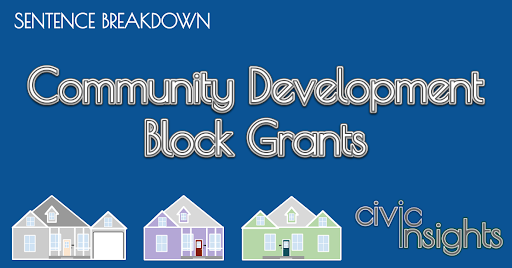
(City council, school board, planning commission, county commissioners – these groups and several others represent us. They do the day to day work of running our community. It is our responsibility to keep informed about their work so that we can help them represent us effectively. “Civic Insights” by Jeffrey Vitarius is a regular feature of Act Locally Waco. Its purpose is to help us understand decisions that shape our community so that we can participate effectively as informed, engaged residents of Waco. – ALW)
By Jeffrey Vitarius
This week we are going to try to unpack the following sentence: “The City Council held a public hearing as part of a series of public hearings and eventually action regarding the 2020-2021 Annual Action Plan for Community Development Block Grant (CDBG) and HOME Investment Partnership Program (HOME) funding.” Let’s jump right in.
What is Community Development Block Grant (CDBG) and HOME Investment Partnership Program funding?
In the broadest sense, these two programs are funding sources from the federal government to local governments, like the City of Waco, to accomplish certain federal priorities. It is theoretically a way for the federal government to pay for services and projects that advance federal goals without directly managing the programs themselves.
The City’s Consolidated Plan (more on that later) provides a good summary of the goals of each of these programs. The CDBG program is aimed at developing urban communities with decent housing, suitable living environments and economic opportunities for low and moderate-income folks. The HOME program has a more focused mission and is aimed at developing affordable housing (both to rent and to own) for low and moderate-income folks.
In Waco this funding has gone to:
- Rehabilitation of owner-occupied housing (including items like roof repairs)
- Code compliance inspections (making sure that housing is “in code” with the standards the city uses to assess livability)
- Job training
- Emergency Housing
- Down Payment Assistance
- Rental Assistance
- Park Improvements (including at Wilbert Austin Sr. Park, Kendrick Park, Dewey Park, Oscar DuConge Park, South Waco Park, North Waco Park, and Bell’s Hill Park)
For the 2020-2021 fiscal year the Annual Action Plan is anticipating funding of $2,082,261. This is less than 0.5% of the City’s overall budget, but the programs funded in this way are critical to some of Waco’s most challenging problems.
The Consolidated Plan notes that the greatest of these challenges is housing affordability. Generally speaking, housing is considered affordable if housing costs are less than 30% of income. In Waco, 39.1% of households spend more than 30% of their income on housing and 21.06% of households spending over 50% of their income on housing.
What is a Consolidated Plan?
The Consolidated Plan is a long-term (five years) look at how the City will use funding from the CDBG and HOME programs to pursue the goals of those programs. The plan breaks down how it was developed, what needs it identifies, how it anticipates meeting those needs, and what resources and partners will be needed in pursuing the programs it lays out.
The development of a Consolidated Plan is a requirement for pursuing this kind of funding, as is the development of Annual Action Plans.
What is an Annual Action Plan?
An Annual Action Plan takes the five-year nature of the Consolidated Plan and looks at what will occur over the next year. This week, the public hearing was focused on the 2020-2021 Annual Action Plan which is the second such plan under the 2019-2023 Consolidated Plan.
Why did the City Council hold a public hearing on the Annual Action Plan?
Given that the services and projects funded by the CDBG and HOME programs are meant to serve the needs of the public, the development of both Consolidated Plans and Annual Action Plans require a good deal of public input. The need for “citizen participation” is so great in these programs that generating this participation gets a plan of its own.
As Raynesha Hundell, Interim Director of Community Services, presented to City Council this week, the City has pursued citizen input through a number of different routes. While preparing the annual action plan they met with neighborhood associations and gathered approximately one-hundred and sixty surveys on the matter. They used this input to identify priorities for this year’s action plan.
Now that an annual action plan has been drafted, the citizen participation plan requires that there be a thirty-day period where the public may review and comment on the Annual Action Plan. That thirty-day period began on the 10th of this month and will conclude on the 9th of October. The participation plan also requires that a public hearing occur during the thirty-day window for public input. The hearing this week was that hearing.
So, let’s go back to our initial sentence: “The City Council held a public hearing as part of a series of public hearings and eventually action regarding the 2020-2021 Annual Action Plan for Community Development Block Grant (CDBG) and HOME Investment Partnership Program (HOME) funding.” I hope that is a little clearer now. As I feel like I keep saying, there is a lot more to unpack in this topic. The presentation that was made to council this week serves as a great introduction.
What happened at City Council?
City Council was broadly supportive of the draft Annual Action Plan and its program-based approach to distributing funding. Additionally, Council Member Sabido asked follow-up questions regarding the map determining where CDBG and HOME funds could be spent (another interesting topic for a different day).
What comes next?
- To October 9th – Public Comment Period Continues
- September 15th – Draft Annual Action Plan Public Hearing
- October 6th – Draft Annual Action Plan Public Hearing
- October 20th- Annual Action Plan will return to City Council for approval
- October 23rd – Annual Action Plan will be submitted to the Department of Housing and Urban Development (HUD) that oversees the CDBG and HOME programs
Other Interesting (to me) Items From the Agenda
- The planning items that were reviewed by the Plan Commission back in August have now made it to the City Council for their review.
- Now that the budget has been passed, there are a number of resolutions concerning contracts the City will need as it pursues the priorities of that budget. These range from procurement of Microsoft 365 to repairing the elevator at the Zoo’s administration building. As City Manager Bradley Ford noted during the City Council Meeting this week, “This agenda is a great one, as well as the first one in October, to read in order to get an understanding of the breadth and depth of municipal operations.”
- The Downtown PID Service and Assessment Plan we discussed two weeks ago has returned for final approval.
Meeting Basics
- Work Session – 3:00 pm / Business Session – 6:00pm
- To watch the recorded session click here (City of Waco Cable Channel, wccc.tv)
- For the full agenda click here
- For the meeting packet with the documents pertinent to the meeting click here.

Jeffrey Vitarius has been actively local since early 2017. He lives in Sanger Heights with partner (JD) and his son (Callahan). He helped found Waco Pride Network and now serves as that organization’s treasurer and Pride Planning Chair. Jeffrey works at City Center Waco where he helps keep Downtown Waco clean, safe, and vibrant. He is a member of St. Alban’s Episcopal Church and graduated from Baylor in 2011.
The Act Locally Waco blog publishes posts with a connection to these aspirations for Waco. If you are interested in writing for the Act Locally Waco Blog, please email [email protected]for more information.
By Anna Hoffman
I first heard about Christian Women’s Job Corps (CWJC) Waco 5 years ago when I joined “Women of Waco” for business networking. We often talked about the needs of CWJC and we regularly gathered items for the students. One WOW meeting 3 years ago the director told the group that they had a need for a volunteer to teach night class Bible Study. I had already wanted to be more involved and here was my chance.
Here it is 3 years later, and it is clear that CWJC, the students and the leaders have had more of an impact on me than I have had on them.
The reason I volunteer is to be a part of something that encourages and equips women. My goal with the Bible Study is to do these same things by reminding the students of two things that encompass a great amount of truth: 1) That there is hope for their future. 2) That God deeply loves them. I want to be involved with an organization that is doing this very thing. At various times in all of our lives, we need to be reminded of these two things. In a Bible Study or through a devotional reading this can be simply done. One of my favorite things to do is to remind others that God loves them and that He is for them. Not because of something we did or didn’t do, but because of the life, death, and resurrection of Jesus Christ.
This is what motivates me to be dedicated to the ladies of CWJC and to their mission to “Nurture Women & Transform Lives.” This is what motivates me to give of my time, resources, and money. The Baskets of Hope fundraiser is designed to give us ALL the opportunity to remind others there is hope for the future and that God seriously loves them. Accomplishing this mission day in and day out comes at a cost.
If we all come together, teachers, mentors, staff, volunteers, donors, and students for this all-encompassing mission of “Nurturing Women, Transforming Lives” the impact will be immeasurable. We will have ladies who are educated with their GED and have the tools to find a good job. But more importantly these same ladies will know they have a community of people who support them and a Savior who loves them. Then they can pass that on.… Hope for the future!
Supporting CWJC Waco brings transformation and hope to women across McLennan County. Join our mission by exploring ways to give at www.wacobaskets.com or contact us at 254-757-0416 for more information.

Anna Hoffman has served for several years as a community leader and community relations director advocating for the care of the sick and elderly. She is the Community Relations Director for Visiting Angels where she has the privilege of serving local healthcare professionals and seniors. Because of her years of being the wife of a wonderful husband, the mother of two amazing kids, a grandmother, a pastor’s wife, and music director, she brings with her a compassionate heart to help connect her clients to the right services for their needs. Anna is actively involved in various community organizations – serving on the board of the Greater Hewitt Chamber of Commerce, chairing events for the Alzheimer’s Association, serving as the President of the Women of Waco, and teaching weekly Bible study at CWJC Waco.
The Act Locally Waco blog publishes posts with a connection to these aspirations for Waco. If you are interested in writing for the Act Locally Waco Blog, please email [email protected] for more information.
By Cindy Gough
My passion for this ministry started years ago. As a single mom for many years, I struggled with schedules, job, finances, family time and any type of “me” time that I could squeeze in. I always felt blessed to be where I was at that exact moment, but always in the back of my mind, I wanted to do more, provide more and be proud of my accomplishments. As important, I wanted to make my kids proud of their mom!
I see those same struggles with the women that come to Christian Women’s Job Corps. I see different backgrounds, different lost opportunities, different sacrifices made over the years and lots of hope in their hearts for a CHANGE!
All women, no matter what their age or situation, want to be proud of who they are and want to have self-esteem and confidence. So many of our women in this ministry are strong and brave and have already achieved so much. I got involved with CWJC Waco to provide that “helping hand” that we’ve all needed at some point in our lives. If we can help change a woman’s education, give her some courage and strength, skills to reach a level perhaps she never dreamed of, and bring her closer to God and renew her faith, then we have done our job at CWJC.
All of this is offered to our women free of charge. We provide that helping hand, a teacher, a volunteer, an education, computer training, a variety of curriculum, a relationship with Jesus Christ, and all at no cost to them. This is only made possible through our generous donors and those that have worked tirelessly over the years. Like every non-profit, we must have fundraisers and monthly donations to keep this ministry viable for the women in our community. Please join us in this campaign and see what you feel you can do financially to help women in their quest to be stronger, gain power in themselves and their families and see a renewed spirit in each of them.
Supporting CWJC Waco brings change to lives across McLennan County. Join our mission by exploring ways to give at www.wacobaskets.com or contact us at 254-757-0416 for more information.
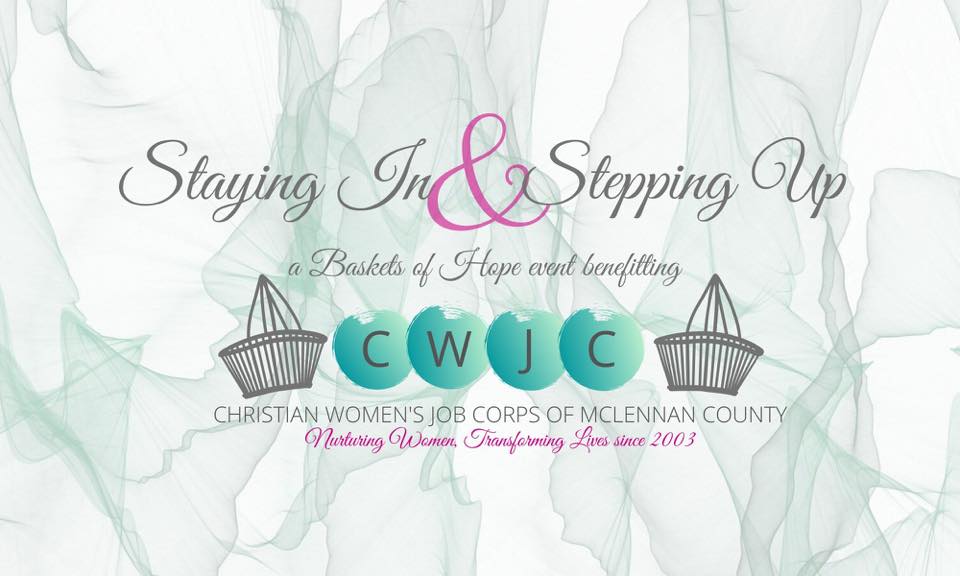
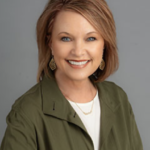
Cindy Gough is a Realtor with Camille Johnson, Realtors here in Waco, Texas. Cindy loves her business and helping clients as well as helping others in her community. She spends many hours serving her community and is involved in her church at Highland Baptist in Waco. Cindy has served on multiple Boards in different agencies across the Waco area. Cindy is a big Baylor Bear fan and loves spending her time off with her family and her 5 grandkids!
The Act Locally Waco blog publishes posts with a connection to these aspirations for Waco. If you are interested in writing for the Act Locally Waco Blog, please email [email protected] for more information.
By Jillian Jones
Communities In Schools of the Heart of Texas (CISHOT) has been known for over 30 years for providing wraparound services to thousands of students and families in the many school districts across our Heart of Texas region. However, many people may not know that Communities In Schools serves youth beyond their school years and into adulthood as well. The Workforce Development Program at CISHOT provides case management, career advancement services, and real-life work experience to young adults to help them work towards post-secondary education and careers that provide stability and opportunity.
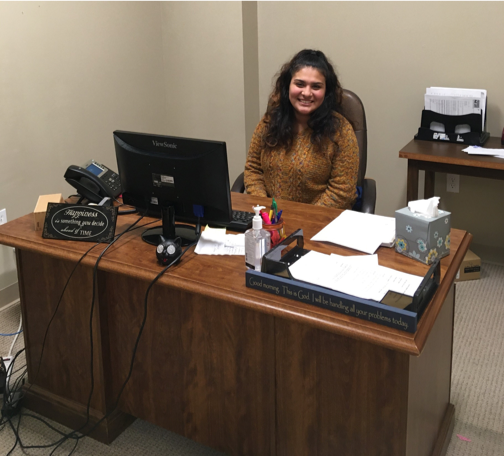
One of the more tangible ways young adults break into the job market is through internships. Internships provide the participant with valuable insight into a career field they may be interested in, as well as access to mentorship and guidance from more experienced workers. Employers can also use internships as vital training time that is needed before an intern can receive a full-time job offer.
While internships have tangible benefits for both the participant and the employer, we understand internships can be costly for an employer and unpaid internships are not as attractive to young people or as common as they used to be.
This is where the Workforce Development Program at Communities In Schools of the Heart of Texas plays a role. With funding and support from the Heart of Texas Workforce Development Board, Communities In Schools is able to provide internships on a year-round, rolling basis at dozens of local businesses across all sectors and industries. These short-term internships are completely free for an employer who volunteers to host an interested participant, as CISHOT acts as the employer of record and covers all wages paid to the intern for the duration of the internship.
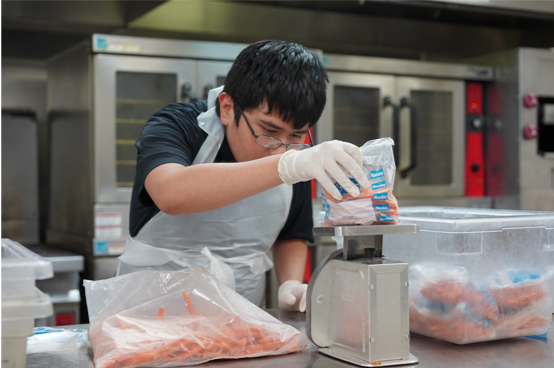
The job market is changing rapidly as we navigate through the pandemic. While some employers are downsizing or shifting to permanent virtual work, others may be having trouble finding enough qualified applicants to return to normal operations. If you’re an employer who is looking to hire or fill open positions amidst the uncertainty, please consider hosting an intern (or two!) through the Workforce Development Program at CISHOT. All interns participate in a four-hour New Hire Training course covering workplace basics and safety guidelines recommended by the Centers for Disease Control and Prevention.
Our 2020 Fall cohort will start on October 12 and will work through December 11. We are looking to expand our employer base and would love to work with YOU on a partnership that can benefit young adults in our community and help your business grow through this season of change!

Jillian Jones is the Director of the Workforce Development Program at Communities In Schools of the Heart of Texas. Jillian is a Waco native and a graduate of Baylor University and the University of North Carolina. She enjoys reading, cooking, spending time with family, doing anything outdoors, and worrisome amounts of online shopping. She has a husband, Jenner, and a dog, Buddy.
The Act Locally Waco blog publishes posts with a connection to these aspirations for Waco. If you are interested in writing for the Act Locally Waco Blog, please email [email protected]for more information.
Press release, City of Waco. Additional Notes, Ashley Bean Thornton
The City of Waco is holding a Virtual Ribbon Cutting to mark the completion of the renovation of the Greenwood Cemetery. The edited virtual ribbon cutting celebration ceremony will air on WCCC-TV (available on Spectrum and Grande cable channel 10 and on the web at www.wccc.tv) at 10 a.m. on Tuesday, September 15.
Greenwood Cemetery is Waco’s second oldest cemetery, dating back to 1875. While Greenwood is the final resting place for many of Waco’s famous and widely celebrated citizens, it has struggled with the legacy of a segregated past.
The $435,000 improvement project was a collaborative effort to remove the boundaries that separated the “White section” from the “Black section” and place the entire cemetery within the City of Waco’s care. Working together were families, citizens and former cemetery association members along with the Texas Historical Commission, Texas Department of Transportation, People’s Cemetery Association, McLennan County, Methodist Children’s Home and the City of Waco.
Here are some brief notes about just a few of the notable people who are buried at Greenwood.
Robert Bevis (1889 – 1972)
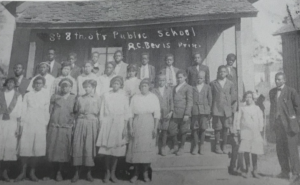
Robert Bevis was born in Austin. He attended Tillotson College there. He later received a Master of Arts from Denver University in Colorado. He organized South Waco Colored Elementary School (later named Oakwood School) in 1914. He was the first principal and served in that role for for 44 years (1914 – 1959), minus one year for serving in WWI. In November of 1915 South Waco Colored School moved into the first brick school for Negroes to be erected in Waco.
Jules Bledsoe (1899 – 1943)

Even as a young child, Jules Bledose loved to sing. He gave his first performance, age five, at New Hope Baptist Church. In 1918 he Graduated Magna Cum Laude from Bishop College. In 1920 he began studying medicine at Columbia University. After taking voice lessons, career plans shifted. In 1924 he made his professional music debut at the Aeolian Hall in mid-town Manhattan. In 1927 his portrayal of Joe in Jerome Kern’s Showboat launched him into the spotlight. His version of “Ol’ Man River” became a classic. Known internationally, he performed across the United States and in Europe. Despite racial discrimination his immense talent and skill earned him the right to perform with BBC Symphony in London, the Royal-Dutch Italian Opera Company, and the Cosmopolitan Opera Association in New York. He was also a composer. He composed several songs and an opera titled “Bondage” based upon Harriet Beecher Stowe’s novel Uncle Tom’s Cabin.
Andrew “Lefty” Cooper (1896 – 1941)

Born in Waco in 1896/1898, Andrew Cooper attended A. J. Moore High School and Paul Quinn College. Prior to the 1940s, Black people could not play baseball in the American Major Leagues. Cooper had successful careers in both the The Negro National League, and the Negro American League. He played for both Detroit and Kansas City. Cooper was known as one of the best pitchers in baseball. He became player/manager of the Monarchs in 1937. By 1940 he had led Kansas City to three championships. Cooper died in 1941 only a few years before Jackie Robinson integrated the major leagues 1946. In 2006 Andrew Cooper was inducted into the Baseball Hall of Fame.
Estella Maxey – (1904-1948)
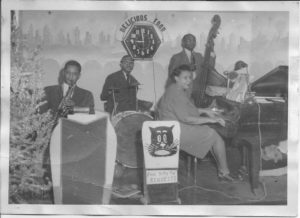
Estella Maxey was an orphan. She was adopted by Gussie Moore and raised on South Second Street near Baylor. Even as a child she was fascinated with music and would slip away to pick out tunes on the piano. She had perfect pitch. During the depression she organized an orchestra to accompany her on the piano and began to play and sing to make a living. Gradually she began playing dance music. Soon she was “all the rage” playing at private parties for all the rich people in town. A generation of young people in Waco learned to dance to the sound of Stella singing “My Blue Heaven,” “Lover, Come back to Me,” “You’re my Everything” and other hits of the time. When she died in 1948, the Waco Tribune-Herald ran her obituary on the front page.
Dr. Vivienne Malone-Mayes (1932 – 1995)
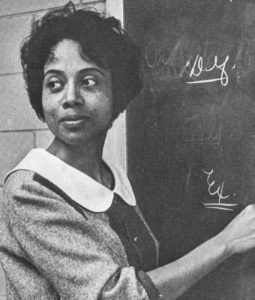
Vivienne Lucille Malone grew up in Waco and graduated at age 16 from A.J. Moore High School, not far from the Baylor campus. She earned bachelor’s and master’s degrees in mathematics from Fisk University. She chaired the math departments at Bishop College in Dallas and then Paul Quinn College, which was in Waco at the time. Because she wanted to take more graduate-level classes courses, she applied to Baylor in 1961, but she was rejected because of her race. In 1962 she enrolled at the University of Texas at Austin, which had been required by federal law to integrate. She persevered to become the second African-American and the first black female to earn a PhD in mathematics from the University of Texas. After earning her PhD, she returned to Waco where she was eventually hired as the first African-American faculty member at Baylor University in 1966. By 1971, Baylor Student Congress named her as an Outstanding Faculty Member of the Year.
(City council, school board, planning commission, county commissioners – these groups and several others represent us. They do the day to day work of running our community. It is our responsibility to keep informed about their work so that we can help them represent us effectively. “Civic Insights” by Jeffrey Vitarius is a regular feature of Act Locally Waco. Its purpose is to help us understand decisions that shape our community so that we can participate effectively as informed, engaged residents of Waco. – ALW)

By Jeffrey Vitarius
What is a fair way to pay for the infrastructure improvements required for new developments? That is the question at the heart of a policy the city has been considering since January 2019: impact fees.
In 2016, the City adopted a comprehensive twenty-five year plan that noted that “the question is not whether Waco will grow, but what form will this growth take. It is important that Waco grow in a manner that is economically, environmentally, and culturally sustainable.” One of the critical challenges this plan identified was that of “increasingly dispersed development,” development occurring farther and farther away from the city’s core.
Why would this be a challenge? Let’s start with the basics. Imagine a set of new homes on a few acres of land that used to be a farm. This new development will need a few things to thrive, for example, roads to connect it to the rest of the city, and pipes to carry water in and wastewater (also known as sewage) out.
Even if there are already roads and pipes in the area, it may not just be a matter of connecting the new development to the existing network. Our new batch of homes will mean increased volume of cars, water, and wastewater in that part of the city. The roads and pipes around the development may need to be upgraded to handle the increased volume. We call these kinds of projects – to construct new roads and pipes or upgrade existing roads and pipes for more volume – “infrastructure improvements.” There are plenty of other kinds of infrastructure improvements, but for the purpose of discussing impact fees, we will focus on these.
It is one of the city’s jobs to construct these pipes and roads. The challenge comes in how to pay for these projects. The city already has a substantial inventory of roads and pipes that it needs to monitor, repair, and eventually replace.
How can the city pay for all of its current obligations much less the additional demands from new development? As the twenty-five year plan identifies “given the limited capacity and deteriorated condition of existing infrastructure, the City cannot afford to provide subsidies to encourage development at suburban densities in rural areas.” In plain English that means: our new set of suburban houses on what used to be farmland creates a financial difficulty for the city. Enter the impact fee.
The concept of the impact fee is fairly straightforward though it can get complicated in implementation and practice. The twenty-five year plan explains that impact fees serve as “a means of ensuring new development pays an equitable share of the costs associated with the construction and expansion of public infrastructure needed to service new development…Impact fees shift some of the cost of financing public facilities [roads and pipes] from the general taxpayer to the direct beneficiaries of these facilities [roads and pipes].”
In other words, impact fees move the cost of improvement from the city generally (where it is paid by existing taxpayers) to the developments that are more directly served by those improvements. If we think back to our former farm, theoretically impact fees would require that the developer pay part of the cost of the roads and pipes. The use of the phrase “equitable share” in the quote above hints at the large complicated question around this simple policy idea. At what amount is an impact fee fair?
Within that question are two considerations, the first is a matter of analysis and the second is a matter of policy. First the city has to determine how much impact fees could be to cover the cost of anticipated development. Then the much more difficult question of how much the impact fees should be can be addressed. In Waco we are in the transition from the could part of this process to the should part of this process.
In July of 2019, the city formed the Capital Improvement Advisory Committee to review the impact fee question (among other things) and make recommendations to the City Council on how to best proceed with this policy. That committee met this week to discuss the conclusion of the could part of the process (maximum fee calculations) and the start of the should part of that process (policy considerations).
Like many of the topics we take a look at in Civic Insights, this one is complicated and will take a few posts to get through. It looks like the City Council will be holding a public hearing on this question on October 6th. I will aim to get us caught up with the could part of the process by then.
Meeting notes:
- Waco Capital Improvements Advisory Committee met on 09/09/20 – For the full agenda click here

Jeffrey Vitarius has been actively local since early 2017. He lives in Sanger Heights with partner (JD) and his son (Callahan). He helped found Waco Pride Network and now serves as that organization’s treasurer and Pride Planning Chair. Jeffrey works at City Center Waco where he helps keep Downtown Waco clean, safe, and vibrant. He is a member of St. Alban’s Episcopal Church and graduated from Baylor in 2011.
The Act Locally Waco blog publishes posts with a connection to these aspirations for Waco. If you are interested in writing for the Act Locally Waco Blog, please email [email protected]for more information.
By Keshia Miller
Beginning September 22nd, WIBO Waco will launch their 5th year of workshops teaching new and existing entrepreneurs how to build profitable, successful businesses.
Many people struggle with starting or growing a business. This entrepreneurial workshop helps individuals overcome various obstacles and guides them to a successful path in starting or growing a business.

Nationally, “Workshop in Business Opportunities” also referred to as WIBO, was started in 1966 by Walter Geier and Mal Woolfolk to enable small business owners and budding entrepreneurs from underserved communities to obtain financial success by starting, operating, and building successful businesses that develop economic power, provide jobs and improve communities. Since the 1st workshop, WIBO has graduated more than 18,000 entrepreneurs, where 75% of WIBO grad’s businesses were up and running within a year of taking the program, and 42% of companies saw an increase in revenue after taking the WIBO program.
The workshop is a success in Waco. “Fluff Wash & Fold is off to a great start due to Workshop in Business Opportunities!” say co-owners Stephanie & Lana. “WIBO taught us to develop our pitch, so that when an opportunity happens, we can be ready to spread the word about our service at a moment’s notice. There was so much more that we’ve taken away and developed on our own with the support of our WIBO community!”
The upcoming workshop will be taught online due to COVID-19. This makes it even more readily available to entrepreneurs in the area.
Some of the business building topics that entrepreneurs will experience during this 16-week course include how to conduct market research to identify your ideal customers, promoting your business, making a profit, creating your pricing strategy, and other actionable and detailed steps that are excellent for a new or budding business.
There is a cost associated with the workshops. However, WIBO offers scholarships to people who are earning less than $40,000, veterans, and individuals who have been recently incarcerated.
For more information, visit wibowaco.org. Join us for a ZOOM info session on Thu Sep 10, 2020 7pm – 8pm (CDT). Click here to register.
Registration is open now for the workshop. Register online at https://www.wibowaco.org to register or by calling (254.292.2423).
Space is limited for the workshops. If you’ve found your life’s passion and want to create a thriving business doing what you love, then the WIBO 10-week workshop is for you. Be sure to act fast.

Rocky and Keshia Miller are the owners of Prosperity Tax Service and Prosperity Travel Group The Cruise Specialists are just two of their roles. They also founded East Waco Empowerment Project and put on the annual Feast in The East which provides a hot holiday meal and warm clothing for neighbors in Waco. They also organize the Workshop in Business Opportunities (WIBO). Rocky and Keshia have four children: Kameren, Rashaad, ReElle & Xjiani. They also have three grandchildren: Ava, Mattix & McKinley
The Act Locally Waco blog publishes posts with a connection to these aspirations for Waco. If you are interested in writing for the Act Locally Waco Blog, please email [email protected] for more information.
Press Release – In partnership with national nonprofit organization the Cities for Financial Empowerment Fund (CFE Fund), the City of Waco has announced the launch of a free Financial Navigators program to help residents navigate financial issues related to the COVID-19 pandemic in conjunction with community partners: Heart of Texas Goodwill Industries, the Cen-Tex Hispanic Chamber of Commerce and Grassroots Community Development.
Financial Navigators will be available beginning August 24th to provide guidance over the phone to help residents access available programs and services to manage income disruptions and other financial concerns they may be experiencing at no cost. With one-on-one discussions, they will help to address personal financial issues, identify immediate steps to manage expenses and maximize income, and make referrals to other services such as bill paying assistance, receiving government services and finding food and childcare assistance. The City of Waco will offer these Financial Navigator services in partnership with Prosper Waco.
Council Member John Kinnaird explains, “We know that our citizens are struggling, and in this environment where stress is high and keeping track of all available resources is difficult at best, being able to provide a comprehensive and helpful resource like the Financial Navigators is invaluable. Being able to get those in our community to the help and resources they need in an effective and timely manner is critical to the overall health and well-being of our residents, and this program will greatly help us achieve that goal.”
To access services, residents can visit: finnav.org/interest-waco and fill out a short form, or they can call (254) 753-7337 to sign up. They will then be contacted to begin their personal session. Organizations across Waco can also refer clients directly to a financial navigator. *Information will also be available at covidwaco.com under Community Resources.
The Financial Navigators program is funded in partnership with the CFE Fund, who provided grant funding along with significant technical assistance and training to launch the program. This initiative is supported by Bloomberg Philanthropies, the CitiFoundation, JPMorgan Chase & Co., and the Wells Fargo Foundation.
“Financial distress is a primary part of the COVID-19 crisis, and we’re pleased the Waco City Council has made this a priority for their residents,” said Jonathan Mintz, President and CEO of the Cities for Financial Empowerment Fund. “The Financial Navigators program will help Waco residents assess and prioritize their financial concerns and get connected with the correct resources.”
“Communities across the country continue to face significant economic challenges as a result of COVID-19,” said Brandee McHale, Head of Citi Community Investing and Development and President of the Citi Foundation. “To provide residents in the City of Waco with the vital financial tools and support necessary to navigate the financial impacts of the pandemic, the Citi Foundation is proud to partner once again with the Cities for Financial Empowerment Fund to launch the Financial Navigators program.”
“The pandemic has clearly heightened awareness around the financial hardships that so many people were already facing here in Waco and deep disparities that exist in society,” said Darlene Goins, head of financial health philanthropy with the Wells Fargo Foundation. “We applaud the CFE Fund for bringing together the City of Waco, philanthropists, and financial services and other industries to reimagine solutions that can help improve financial stability and resiliency for individuals and families, particularly during this economic crisis.”
By Sara Aguirre
This is part 2 of a 4-part series on The Christian Women’s Job Corps of McLennan County. For all of the posts in this series, click here: CWJC. – ALW
Christian Women’s Job Corps is life changing. The women we serve are some of the strongest women I know. Their perseverance to overcome life’s challenges takes courage and bravery, and the women we serve have what it takes to conquer and thrive. My favorite part of my job is listening to the women share their hopes and dreams and helping them create goals to move towards their dreams. CWJC provides free programs, GED and Career Track, for women in McLennan County.

Our GED program provides hope for so many women who haven’t had the opportunity to complete high school. CWJC provides all the materials needed, covers the cost of practice test and GED official test, tutoring, and case management. Career Track offers skills that are holistic to help women prepare for their career. Career Track offers Bible Study, Boundaries, Job readiness (resume writing, mock interviews, and job retention), computer skills, personal development, money management, guest speaker workshops, and mentoring.
Poverty, past mistakes, and failures don’t have to control your life – you can choose to take the steps to a brighter future. I’m actually an alumna of the Career Track program at CWJC. I came into CWJC without a job, phone, car, and living in a long-term recovery home due to my brokenness and choices I had made. CWJC helped me gain the confidence I needed to pursue the dreams God has put into my heart. Shortly after completing the program I went to pursue my dream, earning my degree in social work, now I’m able to give back what I have received. Never give up on the dreams God has put in your heart because with God all things are possible.
None of the work CWJC Waco does would be possible without the support of our donors and community. The transforming work done at CWJC leads to women giving back to their community. Supporting CWJC Waco brings empowerment to women across McLennan County. Join our mission by exploring ways to give at www.wacobaskets.com or contact us at 254-757-0416 for more information.

Sara Aguirre is a CWJC Alumni from Waco, TX. After her time with CWJC, Sara graduated with her undergrad in social work from Tarleton State University and is currently working towards her master’s degree in clinical social work. Sara has served the Waco community since 2006 in various roles and capacities. She has worked with families in the foster care system through the Department of Family Protective Services. Sara is an active member of Antioch Community Church where she has served in the youth ministry, overseas missions, and guest services. Sara is passionate about working with individuals who have experienced trauma and who want to be equipped, empowered, and transformed by the healing power of Jesus. Sara enjoys going to ball games, traveling, learning, and having meaningful conversations over a cup of coffee!
The Act Locally Waco blog publishes posts with a connection to these aspirations for Waco. If you are interested in writing for the Act Locally Waco Blog, please email [email protected] for more information.
